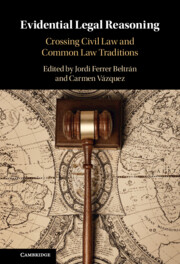Book contents
- Evidential Legal Reasoning
- Evidential Legal Reasoning
- Copyright page
- Contents
- Figures
- Tables
- Contributors
- Introduction
- Part I Evidence As an Area of Knowledge
- Part II Convergences between Systems
- Part III On Evidential Inferences
- Part IV Expert Evidence
- 12 From Institutional to Epistemic Authority: Rethinking Court-Appointed Experts
- 13 Latent Justice
- 14 Prevention and Education
- 15 Evidentiary Practices and Risks of Wrongful Conviction
- Part V Standards of Evidence As Decision-Making Rules
- Index
- References
14 - Prevention and Education
The Path towards Better Forensic Science Evidence
from Part IV - Expert Evidence
Published online by Cambridge University Press: 05 May 2022
- Evidential Legal Reasoning
- Evidential Legal Reasoning
- Copyright page
- Contents
- Figures
- Tables
- Contributors
- Introduction
- Part I Evidence As an Area of Knowledge
- Part II Convergences between Systems
- Part III On Evidential Inferences
- Part IV Expert Evidence
- 12 From Institutional to Epistemic Authority: Rethinking Court-Appointed Experts
- 13 Latent Justice
- 14 Prevention and Education
- 15 Evidentiary Practices and Risks of Wrongful Conviction
- Part V Standards of Evidence As Decision-Making Rules
- Index
- References
Summary
Forensic scientists are influential players in the justice system. At least two reasons may account for the great confidence placed in forensics. On the one hand, most people (and judges) have a rather poor science education, which leads them to place disproportionate expectations on the analysis produced by forensic science labs. On the other hand, DNA profiling has also contributed decisively to the prestige of forensic science. Unfortunately, there is no reason for such strong confidence, and experience shows that forensic science errors are also possible.
- Type
- Chapter
- Information
- Evidential Legal ReasoningCrossing Civil Law and Common Law Traditions, pp. 296 - 322Publisher: Cambridge University PressPrint publication year: 2022
References
- 1
- Cited by

